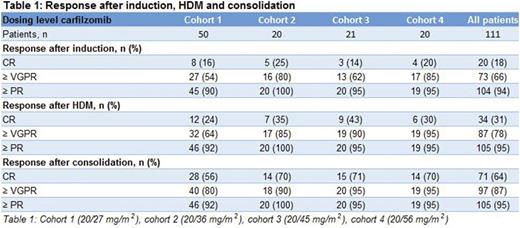Abstract
Introduction
A phase 2 dose escalation trial of Carfilzomib in combination with Thalidomide and Dexamethasone (KTd) for induction and consolidation in newly diagnosed, transplant-eligible patients with multiple myeloma (MM).
We report the results of 4 dose levels.
Methods
In this multicenter, open-label, phase 2 trial, transplant-eligible patients aged between 18 and 65 years with previously untreated symptomatic MM were included. Patients were treated with 4 cycles of escalating dose of Carfilzomib + fixed-dose thalidomide and dexamethasone (KTd) for induction therapy. The dose of Carfilzomib was 20 mg/m2 i.v. on days 1, 2 followed by 27 mg/m2 on days 8, 9, 15, 16 of cycle 1 and on days 1, 2, 8, 9, 15 and 16 of cycles 2 to 4. Thalidomide dose was 200 mg orally on days 1 through 28 and Dexamethasone 40 mg orally on days 1, 8, 15 and 22. Carfilzomib was escalated to 20/36 mg/m2 in cohort 2, to 20/45 mg/m2 in cohort 3 and to 20/56 mg/m2 in cohort 4. Induction was followed by stem cell harvest after Cyclophosphamide priming (2 to 4 mg/m2) and G-CSF. Hereafter patients received high-dose Melphalan (HDM, 200mg/m2) and autologous stem cell transplantation followed by consolidation treatment with 4 cycles of KTd in the same schedule except a lower dose of Thalidomide (50mg).
The primary endpoint was response after induction therapy and overall, specifically complete response (CR) and very good partial response (VGPR). Secondary endpoints were safety, progression-free survival (PFS) and overall survival (OS).
Results
All 111 patients with a median follow-up of 55, 42, 35 and 28 months, in cohorts 1 to 4, respectively were included in the analysis. Median age was 58 years. ISS stages I/II/III were 41%/34%/23%, respectively, R-ISS stages I/II/III/unknown were 23%/59%/9%/9%, respectively.
Of 111 patients, 9 patients stopped treatment during/after induction, 8 patients after cyclophosphamide priming or HDM and 9 patients during consolidation because of toxicity (n=9), non-eligibility for further treatment (n=6), progression (n=5), refusal (n=2) or other reasons (n=4).
Overall response rate for all cohorts was 95%. Response after induction was CR/sCR in 18% of patients, ≥ VGPR in 66% of patients, ≥ PR in 94% of patients. After HDM the CR/sCR rate increased to 31% and after consolidation to 64%. Responses between cohorts were in general comparable. See Table 1.
Response based on risk status by ISS/FISH in either cohort and accumulated did not show a difference in CR/sCR rate after consolidation between standard-risk (67%) and high risk defined as t(4;14) and/or del17p and/or add1q and/or ISS3 (60%). OS at 30 months was comparable between standard risk and high risk, 91% versus 90%. PFS at 30 months for standard risk and high risk was 79% and 62%, logrank p=0.02 (HR=2.3, 95% CI=1.1-4.5).
PFS at 30 months per cohort was 70% (95% CI, 55% to 81%), 70% (95% CI, 45% to 85%), 80% (95% CI, 56% to 92%) and 62% (95% CI, 32% to 82%) in cohorts 1,2, 3 and 4, respectively, and 71% (95% CI, 61% to 79%) in all patients. OS at 30 months per cohort was 90% (95% CI, 77% to 96%), 90% (95% CI, 66% to 97%), 95% (95% CI, 71% to 99%) and 88% (95% CI, 58% to 97%) respectively, and 91% (95% CI, 83% to 95%) in all patients.
Gene expression profiling using the Affymetrix U133 Plus 2.0 GeneChips was performed on purified tumor cells for 49 patients. Using the prognostic classifier EMC92 a high-risk group of patients (16%) was identified versus standard risk (in terms of OS: logrank p=0.06 (HR=3.7, 95% CI=0.8-16.8), and in terms of PFS: logrank p=0.14 (HR=2.1, 95% CI=0.8-6.0)).
Safety analysis for all 111 patients showed non-hematological grade 3 and 4 toxicity, mainly respiratory disorders (in 15%), GI disorders (13%) and skin lesions (10%). Toxicity between cohorts did not show a significant difference. Cardiac adverse events were limited and included heart failure (n=2 at 27 mg/m2), hypertension (n=2) and chest pain (n=1 at 45mg/m2).
Conclusion
Carfilzomib, thalidomide, dexamethasone (KTd) is an effective regimen, with increasing CR percentages following KTd consolidation. With escalated doses of Carfilzomib responses and toxicity were comparable to standard dose of 27 mg/m2.
Zweegman:Takeda: Honoraria, Research Funding; Janssen: Honoraria, Research Funding; Celgene: Honoraria, Research Funding. Kersten:Celgene: Research Funding; Amgen: Honoraria. Minnema:Celgene: Consultancy; BMS: Consultancy; Amgen: Consultancy; Jansen Cilag: Consultancy. Palumbo:Janssen Cilag: Honoraria; Takeda: Employment, Honoraria. Lokhorst:Genmab: Research Funding; Janssen: Membership on an entity's Board of Directors or advisory committees, Research Funding. Broijl:Celgene: Honoraria; Amgen: Honoraria; Janssen: Honoraria. Sonneveld:Karyopharm: Consultancy, Honoraria, Research Funding; Janssen: Consultancy, Honoraria, Research Funding; Takeda: Consultancy, Honoraria; Celgene: Honoraria, Research Funding; Amgen: Consultancy, Honoraria, Research Funding.
Author notes
Asterisk with author names denotes non-ASH members.


This feature is available to Subscribers Only
Sign In or Create an Account Close Modal